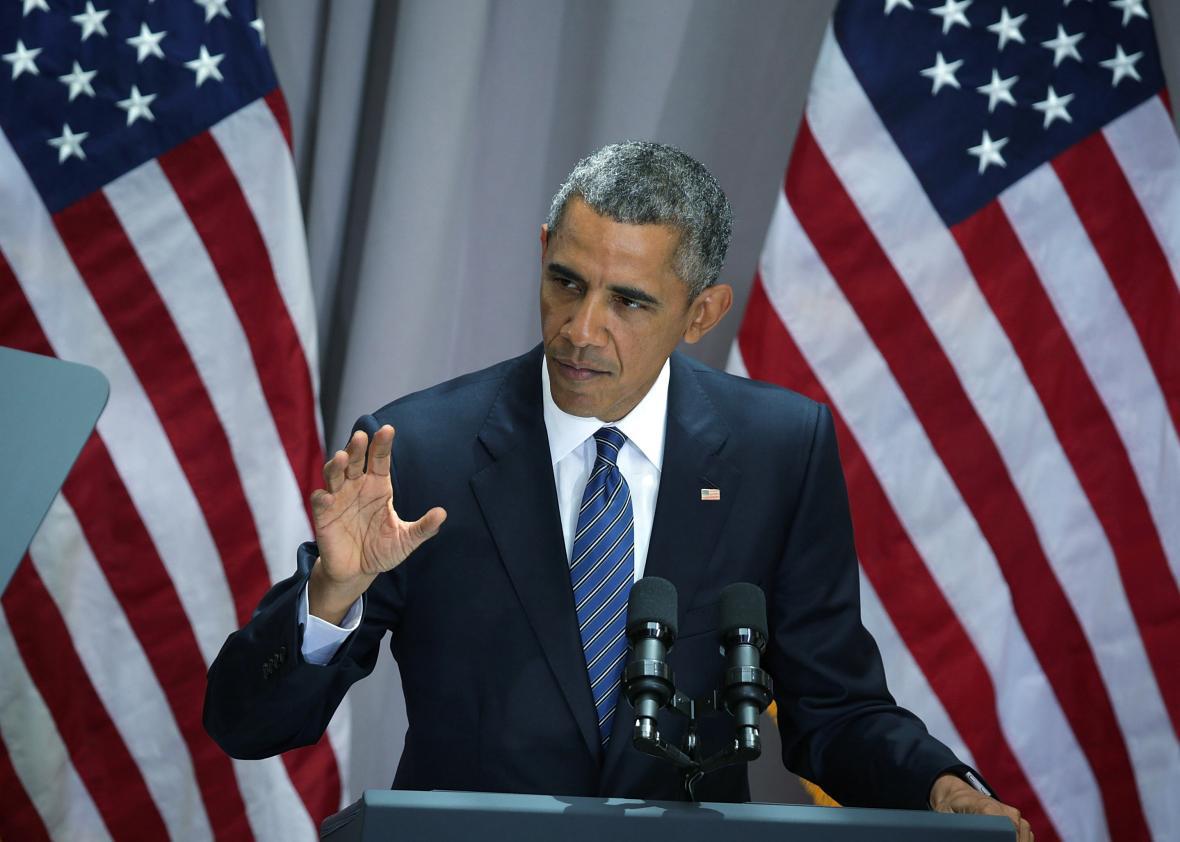President Obama continued his ongoing sales pitch for the Iran nuclear agreement today with a speech at American University that took sharp aim at critics of the deal in Congress and invoked the legacy of Cold War nuclear diplomacy. “I’ve had to make a lot of tough calls as president, but whether or not this deal is good for U.S. national security is not one of those calls. It’s not even close,” he said.
Some of the speech was devoted to deflecting criticism of what Obama called “the strongest nonproliferation agreement ever negotiated,” including complaints about the inspections system that will be put in place, the amount of Iran’s nuclear infrastructure that will remain, and whether sanctions relief will allow Iran to increase its support for terrorism. The president acknowledged that some of the money Iran receives would go towards that support, but said that Iran would fund these groups regardless and that the majority of the relief would have to go toward pressing domestic economic needs that “even a repressive regime like Iran cannot entirely ignore.”
But as I wrote last week, the argument over the deal is less about its specifics than about whether a diplomatic resolution to the nuclear standoff with Iran is even possible, and that’s where Obama devoted most of his attention, saying, “An argument against sanctions relief is an argument against any diplomatic solution to this issue.”
“Let’s not mince words,” he said, “the choice we face is ultimately between diplomacy and some form of war.” He argued that if Congress were to reject the agreement, the international sanctions regime against Iran would unravel, meaning the regime would get relief from other countries without having to make any concessions. “Those who say we can just walk away from this deal and maintain sanctions are selling a fantasy,” he said. Perhaps anticipating the withering criticism he’s sure to receive at tomorrow’s Republican debate, Obama disparaged “vague promises of toughness” and said that those who believe Iran can be pressured into complete submission are “either ignorant of Iranian society or they’re not being straight with the American people.”
The president also said that Iranian hardliners are “making common cause with the Republican caucus” in opposition to the deal and said that many of those criticizing the deal are the same who pushed for the 2003 war in Iraq and “seem to have no compunction with being repeatedly wrong.”
While Obama emphasized the international support for the deal, he also called out Israeli Prime Minister Benjamin Netanyahu, saying, “I do not doubt his sincerity, but I believe he is wrong.” Claiming to have done “more than any other president to strengthen Israel’s security,” Obama argued that Israel has the capability to meet any conventional military threat. He also made the case that despite the prime minister’s objections, the deal is the best way to prevent an Iranian nuclear weapon that would pose a much more dire threat to the Jewish state. (That argument is unikely to convince Netanyahu.)
The location of the speech was deliberately chosen by the White House to evoke John F. Kennedy’s 1963 commencement address, which made the case for the negotiations that would eventually the Limited Test Ban Treaty with the Soviet Union. Returning to an argument he made in an interview with Jon Stewart, Obama pointed out that “the agreements pursued by Kennedy and Reagan with the Soviet Union involved America accepting significant constraints on our arsenal. As such they were riskier. This agreement involves no such constraints.”
Obama borrowed a few themes from Kennedy’s speech. Just as Kennedy argued that “no government or social system is so evil that its people must be considered as lacking in virtue,” Obama made the case that “just because Iranian hardliners chant death to America does not mean that’s what all Iranians believe.” Obama’s address may have lacked some of Kennedy’s grandeur—his zingers at Republicans weren’t quite as bold as the 35th president’s call on Americans to “reexamine our own attitude, as individuals and as a nation” toward the prospect of peace—but it was overall an exceptionally effective sales pitch. With the White House getting very close to the number of Democrats it needs to protect the president’s veto, it could be just enough.
